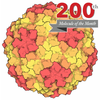[English] 日本語
 Yorodumi
Yorodumi- PDB-7yrf: Cryo-EM structure of compact CA16 empty particle in complex with ... -
+ Open data
Open data
- Basic information
Basic information
| Entry | Database: PDB / ID: 7yrf | ||||||
|---|---|---|---|---|---|---|---|
| Title | Cryo-EM structure of compact CA16 empty particle in complex with a neutralizing antibody 8C4 | ||||||
 Components Components |
| ||||||
 Keywords Keywords | STRUCTURAL PROTEIN / coxsackievirus A16 / antibody 8C4 / cryo-EM | ||||||
| Function / homology |  Function and homology information Function and homology informationsymbiont-mediated suppression of host cytoplasmic pattern recognition receptor signaling pathway via inhibition of MDA-5 activity / picornain 2A / symbiont-mediated suppression of host mRNA export from nucleus / symbiont genome entry into host cell via pore formation in plasma membrane / picornain 3C / T=pseudo3 icosahedral viral capsid / host cell cytoplasmic vesicle membrane / virion component / host cell / nucleoside-triphosphate phosphatase ...symbiont-mediated suppression of host cytoplasmic pattern recognition receptor signaling pathway via inhibition of MDA-5 activity / picornain 2A / symbiont-mediated suppression of host mRNA export from nucleus / symbiont genome entry into host cell via pore formation in plasma membrane / picornain 3C / T=pseudo3 icosahedral viral capsid / host cell cytoplasmic vesicle membrane / virion component / host cell / nucleoside-triphosphate phosphatase / channel activity / monoatomic ion transmembrane transport / DNA replication / RNA helicase activity / endocytosis involved in viral entry into host cell / symbiont-mediated activation of host autophagy / RNA-directed RNA polymerase / cysteine-type endopeptidase activity / viral RNA genome replication / RNA-directed RNA polymerase activity / DNA-templated transcription / symbiont entry into host cell / virion attachment to host cell / host cell nucleus / structural molecule activity / ATP hydrolysis activity / proteolysis / RNA binding / zinc ion binding / ATP binding / membrane Similarity search - Function | ||||||
| Biological species |   Coxsackievirus A16 Coxsackievirus A16 | ||||||
| Method | ELECTRON MICROSCOPY / single particle reconstruction / cryo EM / Resolution: 2.91 Å | ||||||
 Authors Authors | Cong, Y. / Liu, C.X. | ||||||
| Funding support |  China, 1items China, 1items
| ||||||
 Citation Citation |  Journal: Nat Commun / Year: 2022 Journal: Nat Commun / Year: 2022Title: Molecular mechanism of antibody neutralization of coxsackievirus A16. Authors: Chao Zhang / Caixuan Liu / Jinping Shi / Yalei Wang / Cong Xu / Xiaohua Ye / Qingwei Liu / Xue Li / Weihua Qiao / Yannan Yin / Yao Cong / Zhong Huang /  Abstract: Coxsackievirus A16 (CVA16) causes hand, foot and mouth disease in infants and young children. However, no vaccine or anti-viral agent is currently available for CVA16. Here, the functions and working ...Coxsackievirus A16 (CVA16) causes hand, foot and mouth disease in infants and young children. However, no vaccine or anti-viral agent is currently available for CVA16. Here, the functions and working mechanisms of two CVA16-specific neutralizing monoclonal antibodies (MAbs), 9B5 and 8C4, are comprehensively investigated. Both 9B5 and 8C4 display potent neutralization in vitro and prophylactic and therapeutic efficacy in a mouse model of CVA16 infection. Mechanistically, 9B5 exerts neutralization primarily through inhibiting CVA16 attachment to cell surface via blockade of CVA16 binding to its attachment receptor, heparan sulfate, whereas 8C4 functions mainly at the post-attachment stage of CVA16 entry by interfering with the interaction between CVA16 and its uncoating receptor SCARB2. Cryo-EM studies show that 9B5 and 8C4 target distinct epitopes located at the 5-fold and 3-fold protrusions of CVA16 capsids, respectively, and exhibit differential binding preference to three forms of naturally occurring CVA16 particles. Moreover, 9B5 and 8C4 are compatible in formulating an antibody cocktail which displays the ability to prevent virus escape seen with individual MAbs. Together, our work elucidates the functional and structural basis of CVA16 antibody-mediated neutralization and protection, providing important information for design and development of effective CVA16 vaccines and antibody therapies. | ||||||
| History |
|
- Structure visualization
Structure visualization
| Structure viewer | Molecule:  Molmil Molmil Jmol/JSmol Jmol/JSmol |
|---|
- Downloads & links
Downloads & links
- Download
Download
| PDBx/mmCIF format |  7yrf.cif.gz 7yrf.cif.gz | 217.4 KB | Display |  PDBx/mmCIF format PDBx/mmCIF format |
|---|---|---|---|---|
| PDB format |  pdb7yrf.ent.gz pdb7yrf.ent.gz | 170 KB | Display |  PDB format PDB format |
| PDBx/mmJSON format |  7yrf.json.gz 7yrf.json.gz | Tree view |  PDBx/mmJSON format PDBx/mmJSON format | |
| Others |  Other downloads Other downloads |
-Validation report
| Summary document |  7yrf_validation.pdf.gz 7yrf_validation.pdf.gz | 944.1 KB | Display |  wwPDB validaton report wwPDB validaton report |
|---|---|---|---|---|
| Full document |  7yrf_full_validation.pdf.gz 7yrf_full_validation.pdf.gz | 959.8 KB | Display | |
| Data in XML |  7yrf_validation.xml.gz 7yrf_validation.xml.gz | 39.1 KB | Display | |
| Data in CIF |  7yrf_validation.cif.gz 7yrf_validation.cif.gz | 58.5 KB | Display | |
| Arichive directory |  https://data.pdbj.org/pub/pdb/validation_reports/yr/7yrf https://data.pdbj.org/pub/pdb/validation_reports/yr/7yrf ftp://data.pdbj.org/pub/pdb/validation_reports/yr/7yrf ftp://data.pdbj.org/pub/pdb/validation_reports/yr/7yrf | HTTPS FTP |
-Related structure data
| Related structure data |  34054MC 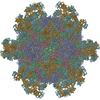 7y7mC 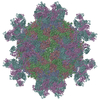 7ymsC  7yrhC  7yv2C  7yv7C M: map data used to model this data C: citing same article ( |
|---|---|
| Similar structure data | Similarity search - Function & homology  F&H Search F&H Search |
- Links
Links
- Assembly
Assembly
| Deposited unit | 
|
|---|---|
| 1 | x 60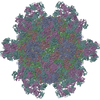
|
| 2 |
|
| 3 | x 5
|
| 4 | x 6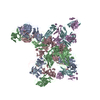
|
| 5 | 
|
| Symmetry | Point symmetry: (Schoenflies symbol: I (icosahedral)) |
- Components
Components
-Protein , 3 types, 3 molecules ABC
| #1: Protein | Mass: 25623.205 Da / Num. of mol.: 1 Source method: isolated from a genetically manipulated source Source: (gene. exp.)   Coxsackievirus A16 / Production host: Coxsackievirus A16 / Production host:  |
|---|---|
| #3: Protein | Mass: 33772.840 Da / Num. of mol.: 1 Source method: isolated from a genetically manipulated source Source: (gene. exp.)   Coxsackievirus A16 / Production host: Coxsackievirus A16 / Production host:  References: UniProt: M4TAU2, picornain 2A, nucleoside-triphosphate phosphatase, picornain 3C, RNA-directed RNA polymerase |
| #5: Protein | Mass: 26646.318 Da / Num. of mol.: 1 Source method: isolated from a genetically manipulated source Source: (gene. exp.)   Coxsackievirus A16 / Production host: Coxsackievirus A16 / Production host:  References: UniProt: A9LXZ4, picornain 2A, nucleoside-triphosphate phosphatase, picornain 3C, RNA-directed RNA polymerase |
-Antibody , 2 types, 2 molecules EF
| #2: Antibody | Mass: 23619.988 Da / Num. of mol.: 1 Source method: isolated from a genetically manipulated source Source: (gene. exp.)   Coxsackievirus A16 / Production host: Coxsackievirus A16 / Production host:  |
|---|---|
| #4: Antibody | Mass: 22743.381 Da / Num. of mol.: 1 Source method: isolated from a genetically manipulated source Source: (gene. exp.)   Coxsackievirus A16 / Production host: Coxsackievirus A16 / Production host:  |
-Non-polymers , 1 types, 1 molecules 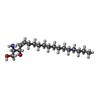
| #6: Chemical | ChemComp-SPH / |
|---|
-Details
| Has ligand of interest | Y |
|---|---|
| Has protein modification | Y |
-Experimental details
-Experiment
| Experiment | Method: ELECTRON MICROSCOPY |
|---|---|
| EM experiment | Aggregation state: PARTICLE / 3D reconstruction method: single particle reconstruction |
- Sample preparation
Sample preparation
| Component | Name: Cryo-EM structure of compact CA16 empty particle in complex with a neutralizing antibody 8C4 Type: COMPLEX / Entity ID: #1-#5 / Source: RECOMBINANT |
|---|---|
| Source (natural) | Organism:   Coxsackievirus A16 Coxsackievirus A16 |
| Source (recombinant) | Organism:  Cercopithecus (mammal) Cercopithecus (mammal) |
| Buffer solution | pH: 7.5 |
| Specimen | Embedding applied: NO / Shadowing applied: NO / Staining applied: NO / Vitrification applied: YES |
| Vitrification | Cryogen name: ETHANE |
- Electron microscopy imaging
Electron microscopy imaging
| Experimental equipment |  Model: Titan Krios / Image courtesy: FEI Company |
|---|---|
| Microscopy | Model: FEI TITAN KRIOS |
| Electron gun | Electron source:  FIELD EMISSION GUN / Accelerating voltage: 300 kV / Illumination mode: FLOOD BEAM FIELD EMISSION GUN / Accelerating voltage: 300 kV / Illumination mode: FLOOD BEAM |
| Electron lens | Mode: BRIGHT FIELD / Nominal defocus max: 2500 nm / Nominal defocus min: 800 nm |
| Image recording | Electron dose: 50 e/Å2 / Detector mode: SUPER-RESOLUTION / Film or detector model: GATAN K3 BIOQUANTUM (6k x 4k) |
- Processing
Processing
| CTF correction | Type: PHASE FLIPPING AND AMPLITUDE CORRECTION |
|---|---|
| 3D reconstruction | Resolution: 2.91 Å / Resolution method: FSC 0.143 CUT-OFF / Num. of particles: 20196 / Symmetry type: POINT |
 Movie
Movie Controller
Controller







 PDBj
PDBj


